Richard Tubb's Blog, page 58
February 7, 2020
Equiwatt – Energy-Saving That Pays
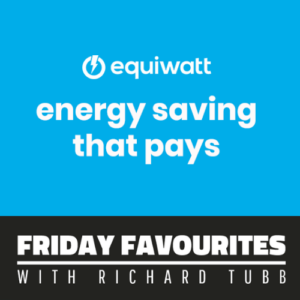 Would you like to help reduce your household energy consumption and get paid for doing so?
Would you like to help reduce your household energy consumption and get paid for doing so?
Every Friday I share one of my favourite finds of the week — a website, tool or an app that has impressed me.
My Friday Favourite this week is Equiwatt – Energy Saving That Pays.
What is it?
Equiwatt is an app that pays you for turning off home appliances at peak times of national energy usage.
How much does EquiWatt cost?
Equiwatt is free to use.
Equiwatt Smart Energy Saving
Equiwatt is a Newcastle-Upon-Tyne, UK based business that provides an app to help reduce energy consumption by using smart technology to automatically turn appliances off.
During peak-times of energy consumption (think half-time during a televised football match, or the advertisement break in Coronation Street) the National Grid faces a surge in demand for electricity.
To meet this demand, additional (and typically, old-fashioned coal burning) power stations are fired up to provide this electricity. This is expensive and dirty for the environment.
Equiwatt gets paid by energy companies for reducing this peak-time demand.
The way Equiwatt do this is by building a community of people who use their app.
Once you are registered on the app, the app can connect to a Smart Plug (the TP-Link Smart Plug – HS110, which retails at £19.99) which you then connect to a household appliance.
During peak-time energy usage, the app will turn off those appliances, reducing your energy consumption.
You are rewarded for these “equivents” of up to-60 minutes in Amazon gift vouchers.
The type of appliances you can use Equiwatt with include:-
Fridges and Freezers – switched on 24/7, food is safe for up to 3 hours in a fridge or freezer without power.
Tumble Dryers and Washing Machines
Electric Vehicles, Battery Chargers or HeatPumps
Here’s Equiwatt CEO and founder Johnson Fernandes talking about Equiwatt, courtesy of the North-East Business and Innovation Centre.
I’ve written before about How to be a Green Technology Geek and as somebody who is passionate about tech and the ability to reduce our environmental impact, I love the idea behind this tech.
We’ve had an HS110 smart plug attached to our freezer, and have been rewarded for multi equivents. We’ve literally not noticed these happening, and our food has been absolutely fine (how often do you open the freezer door?).
How can I get it?
Visit the Equiwatt homepage and register for a free account.
You can download the Equiwatt app for Android and iOS.
You might also follow @EquiwattUK on Twitter, Equiwatt Ltd on LinkedIn or visit the Equiwatt Facebook page.
Thanks to Paul Lancaster for introducing me to Equiwatt at Newcastle Startup Week.
You Might Also Be Interested In
How to Prevent Waste and Be An Extreme Recycler
How to use Carbon Offsetting to reduce your Carbon Footprint
How to Dispose of IT Equipment Ethically
The post Equiwatt – Energy-Saving That Pays appeared first on Richard Tubb.



EquiWatt – Energy-Saving That Pays
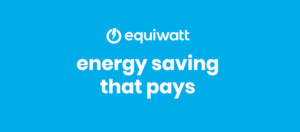 Would you like to help reduce your household energy consumption and get paid for doing so?
Would you like to help reduce your household energy consumption and get paid for doing so?
Every Friday I share one of my favourite finds of the week — a website, tool or an app that has impressed me.
My Friday Favourite this week is EquiWatt – Energy Saving That Pays.
What is it?
EquiWatt is an app that pays you for turning off home appliances at peak times of national energy usage.
How much does EquiWatt cost?
EquiWatt is free to use.
EquiWatt Smart Energy Saving
EquiWatt is a Newcastle-Upon-Tyne, UK based business that provides an app to help reduce energy consumption by using smart technology to automatically turn appliances off.
During peak-times of energy consumption (think half-time during a televised football match, or the advertisement break in Coronation Street) the National Grid faces a surge in demand for electricity.
To meet this demand, additional (and typically, old-fashioned coal burning) power stations are fired up to provide this electricity. This is expensive and dirty for the environment.
EquiWatt gets paid by energy companies for reducing this peak-time demand.
The way EquiWatt do this is by building a community of people who use their app.
Once you are registered on the app, the app can connect to a Smart Plug (the TP-Link Smart Plug – HS110, which retails at £19.99) which you then connect to a household appliance.
During peak-time energy usage, the app will turn off those appliances, reducing your energy consumption.
You are rewarded for these “equivents” of up to-60 minutes in Amazon gift vouchers.
The type of appliances you can use EquiWatt with include:-
Fridges and Freezers – switched on 24/7, food is safe for up to 3 hours in a fridge or freezer without power.
Tumble Dryers and Washing Machines
Electric Vehicles, Battery Chargers or HeatPumps
Here’s EquiWatt CEO and founder Johnson Fernandes talking about EquiWatt, courtesy of the North-East Business and Innovation Centre.
I’ve written before about How to be a Green Technology Geek and as somebody who is passionate about tech and the ability to reduce our environmental impact, I love the idea behind this tech.
We’ve had an HS110 smart plug attached to our freezer, and have been rewarded for multi equivents. We’ve literally not noticed these happening, and our food has been absolutely fine (how often do you open the freezer door?).
How can I get it?
Visit the EquiWatt homepage and register for a free account.
You can download the EquiWatt app for Android and iOS.
You might also follow @EquiWattUK on Twitter, EquiWatt Ltd on LinkedIn or visit the EquiWatt Facebook page.
Thanks to Paul Lancaster for introducing me to EquiWatt at Newcastle Startup Week.
You Might Also Be Interested In
How to Prevent Waste and Be An Extreme Recycler
How to use Carbon Offsetting to reduce your Carbon Footprint
How to Dispose of IT Equipment Ethically
The post EquiWatt – Energy-Saving That Pays appeared first on Richard Tubb.



January 30, 2020
Kiva – Micro-Loans That Change Lives
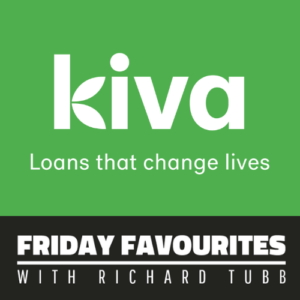 The sum of $25 may not feel like a lot of money to you, but to a low-income entrepreneur in a different country, it may be a life-changing sum.
The sum of $25 may not feel like a lot of money to you, but to a low-income entrepreneur in a different country, it may be a life-changing sum.
Every Friday I share one of my favourite finds of the week — a website, tool or an app that has impressed me.
My Friday Favourite this week is Kiva – Loans That Change Lives.
What is it?
Kiva is a non-profit online platform that allows you to make micro-loans (not donations) to low-income entrepreneurs in economically deprived countries.
How much does it cost?
Kiva recommends a donation of $3 for each $25 loan you make through its online platform.
Kiva – Micro-Loans That Change Lives
I’ve written before about my love for projects that can change lives in other parts of the world. For instance, GiveMeTap – Reusable Water Bottles That Funds Water Projects.
Kiva is an online platform that connects lenders with low-income entrepreneurs in economically deprived countries.
Their mission is “to expand financial access to help underserved communities thrive.
It works a little like a crowdfunding site.
Kiva lists the personal stories of low-income entrepreneurs who are looking for funding to start or grow their business.
You can then lend $25 (or any amount) to your chosen entrepreneurs to help crowdfund their plans.
If the entrepreneurs meet their loan-raising goals within a set period of time, then they are granted the loan.
Kiva then works with field partners across the world to administer the loan.
Neither Kiva nor you collect interest on these loans. However, the borrowers do pay low-levels of interest to most field partners.
The money you give to Kiva is a loan, not a donation. 96.8% of the money loaned is repaid by the entrepreneurs it is loaned to.
You are then free to loan this money back to other low-income entrepreneurs who are crowd-funding their business.
The Kiva business-model is funded by voluntary donations that you make every time you loan money. 100% of these donations go to the field.
I’ve personally helped crowd-fund all manner of businesses across the world including:-
Saidinsa, a 58-year dairy farmer in Kyrgyzstan, to help her purchase new cows.
Matsebiso, a 35-year-old woman Lesotho, to help her purchase a bio-mass and solar-powered cookstove to replace their paraffin-powered stove
Blanca in El Salvador, to help her to purchase stock for her shop
There is all manner of crowd-funded ideas to be found, including women, agricultural, eco-friendly and live-stock based loans.
I personally make my loans without any expectation of receiving the money back, but typically I do find that I’m repaid. I then re-loan the money to another entrepreneur.
Using Kiva is a great way to lend small sums of money that will make a big difference to people in other parts of the world.
How can I get it?
Visit Kiva, create an account and follow the instructions to make your first loan.
You can also visit the Kiva Facebook page, follow @Kiva on Twitter, or follow Kiva on LinkedIn.
Thanks to Robert Crane of CIAOPS for first introducing me to Kiva!
You Might Also Be Interested In
Plum – Save Money Automatically using Facebook Messenger
Moodbeam – Monitor Your Emotional Wellbeing
Chip – Save money automatically and feel good about it
The post Kiva – Micro-Loans That Change Lives appeared first on Richard Tubb.



January 23, 2020
Signal – Secure SMS Messenger Client
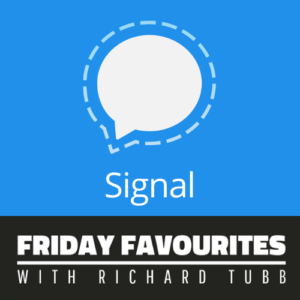
Do you want a Secure SMS Messenger Client so that you can swap text and instant messages with friends in the same app?
Every Friday I share one of my favourite finds of the week — a website, tool or an app that has impressed me.
My Friday Favourite this week is Signal – Secure SMS Messenger Client.
What is it?
Secure is an instant messaging app that incorporates SMS (Short Message Client — more commonly known on Smartphones as “text message”) so that you can exchange messages with friends on any platform.
How much does it cost?
Signal Messenger is free to use.
Secure SMS Messenger Client
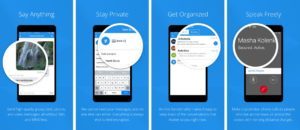 In much the same way that it’s possible to send large attachments via email, but you really shouldn’t (as email wasn’t meant for large attachments) you can use SMS text messages to send pictures and other media, but there are much stronger methods of doing so.
In much the same way that it’s possible to send large attachments via email, but you really shouldn’t (as email wasn’t meant for large attachments) you can use SMS text messages to send pictures and other media, but there are much stronger methods of doing so.
Using tools like WhatsApp or Telegram Secure Messenger means that you can send pictures, video and audio for free to anyone in the world.
But if the recipient doesn’t have WhatsApp or Telegram installed, then you need to rely on SMS text messaging.
Most Europeans like myself are used to experiencing free SMS messages in their country. However, for us in the UK sending SMS messages internationally is still chargeable. So, if you have friends in the USA, Australia or other parts of the world, then you can quickly rack up a sizeable messaging bill.
Signal is a secure SMS Messenger client that will enable you to send secure text, pictures, video and audio for free to anybody who also uses Signal Messenger. But, if they don’t use Signal Messenger, then it will send the message as a plain-old text message.
Signal also allows you to receive standard SMS messages from anybody, as you normally would.
Many of the other Messenger platforms (such as Facebook Messenger) also allow you to allow them to “take over” the SMS function on your Smartphone. Signal, however, incorporates SMS messaging in the most seamlessly way I’ve yet found.
You can also use Signal to make and receive voice and video calls to anybody else who uses Signal. You can do this without incurring any call charges.
The Signal messenger code is open-source and highly secure, meaning your messages and calls won’t fall into the wrong hands.
You can also use group messaging within Signal, and set Signal messages to disappear after a certain interval.
In an ideal world, everybody would use a single messaging system like Signal. Until then, SMS will remain a necessity but Signal will allow you to manage all your messages in one app.
How can I get it?
Signal is available for Android, iPhone and Desktop systems (Windows, Mac and Linux).
You can find out more and download Signal from the Signal homepage.
You can also follow @SignalApp on Twitter or visit the Signal Private Messenger Facebook page.
You Might Also Be Interested In
Hullomail – Smart Voicemail in the Cloud
diskAshur2 – The Fort Knox of Hard Drives!
How to Protect the Data on your Laptop or Mobile Device
The post Signal – Secure SMS Messenger Client appeared first on Richard Tubb.



January 16, 2020
Chrome Extension – Hide Facebook Like Notifications
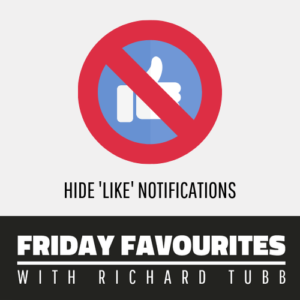 Do you find yourself trying to find ways to spend less time dealing with a constant deluge of Facebook notifications? Wouldn’t life be easier if you could simply hide the pointless Facebook Like notifications?
Do you find yourself trying to find ways to spend less time dealing with a constant deluge of Facebook notifications? Wouldn’t life be easier if you could simply hide the pointless Facebook Like notifications?
Every Friday I share one of my favourite finds of the week — a website, tool or an app that has impressed me.
My Friday Favourite this week is a Chrome Extension – Hide Facebook Like Notifications.
What is it?
Hide ‘Like’ Notifications is a Chrome web-browser extension that enables you to Hide Facebook Like Notifications.
Friends can still ‘like’ your posts, but you’ll no longer have to see the pointless notification telling you your post has been liked.
How much does it cost?
Hide ‘Like’ Notifications is free to use.
How can you Hide Facebook Like Notifications?
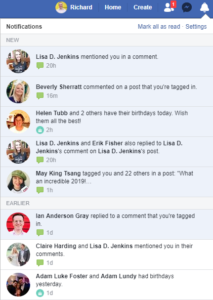 My wonderfully “like” free Facebook Notifications window
My wonderfully “like” free Facebook Notifications windowIf you’re anything like me, then you have a love/hate relationship with Facebook. I’m often asked the question Should You Quit Facebook?
My answer is always that Facebook can be a very useful tool — if you use it intentionally.
My intentional use of Facebook includes reducing the number of notifications I receive.
Much like my approach to email with Inbox Zero (read my article on What is GTD and how it helps with productivity) I like to batch and zero out my Facebook notifications so that I’m not being distracted. I can then use Facebook for the things I want to use it for — such as communities and keeping in touch with friends.
The Chrome extension Hide ‘Like’ Notifications is a great tool for reducing the distractions on Facebook.
Once installed, the extension simply hides any “Someone likes your post” notifications on Facebook.
People can still like your posts, but you won’t be pointlessly notified of it. This will reduce the noise in your notifications and leave you to only see the notifications that matter to you — such as people who have commented on your posts.
How can I get it?
You can install Hide ‘Like’ Notifications from the Google Chrome web store.
Thanks to extension author Hideto Ishibashi for producing such a useful Chrome extension!
You Might Also Be Interested In
AgoraPulse – Inbox Zero for Social Media
News Feed Eradicator for Facebook
SimpleExtManager – Google Chrome Extension Manager
The post Chrome Extension – Hide Facebook Like Notifications appeared first on Richard Tubb.



January 9, 2020
Ate – The Mindful Food Journaling App
 Do you know what you eat each day? Most of us would say we do, but mindful food journaling can help you see what you really eat — including all those snacks…
Do you know what you eat each day? Most of us would say we do, but mindful food journaling can help you see what you really eat — including all those snacks…
Every Friday I share one of my favourite finds of the week — a website, tool or an app that has impressed me.
My Friday Favourite this week is Ate – The Mindful Food Journaling App.
What is it?
Ate is the mindful food journaling app for iOS and Android.
The Ate app allows you to take photographs of each of your meals (and snacks) so you can become more aware of what you are eating each day.
How much does it cost?
Ate is free to use.
An App for Mindful Food Journaling
Most of us think we know what we eat on a day-to-day basis. But for anyone who is trying to lose weight or eat healthier, the idea of keeping a food journal is a powerful one.
In the same way that I use the Moodbeam wristband to monitor my emotional wellbeing, you can use Ate to track your emotional eating habits.
You use the Ate app to take a photograph of every meal, snack and treat you eat.
The Ate app doesn’t make any judgements on what you are eating and doesn’t require you to measure, weigh or count portions.
However, by taking these photographs of your meals, you become more mindful of what you are actually eating.
Within the app, you can designate a photographed meal as “on track” or “off-track”. You can then check statistics within the Ate app to tell you how well you are doing at staying on track.
You can also share your Ate meals with friends or a coach to add an accountability element.
Ate also allows you to import photos you took of earlier meals. Ate will then extract the time/date of those meal photographs and add them to your journal. Handy if you don’t have an Internet connection when you’re about to eat.
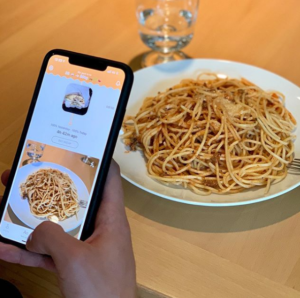 You can also manually input text entries for meals when you may have forgotten to take a photograph.
You can also manually input text entries for meals when you may have forgotten to take a photograph.
If you do intermittent fasting (as I do) then Ate also tells you how long it has been since you last ate a meal.
I’ve been using the Ate app for a few months now, and it has made me much more mindful of my diet.
I’ve built the habit of using the Ate app to photograph all my meals, not just the healthy ones. This has encouraged me to be more mindful about what I eat — as the evidence will be there forever!
How can I get it?
You can download Ate for iOS or Android from the Ate homepage.
You can also visit the Ate Facebook page, or follow @YouAteApp on Twitter.
Thanks to The Health Heroine, Aileen Smith for recommending the Ate app to me!
You Might Also Be Interested In
Action for Happiness – An Action Coach in Your Pocket
How Journaling and Trying New Things Can Improve Your Business and Your Life – TubbTalk #37
Why Discipline and Planning are Vital to Success in Business and Life – TubbTalk #29
The post Ate – The Mindful Food Journaling App appeared first on Richard Tubb.



January 8, 2020
The 2020 List of Awesome Events for MSPs
 Each year I produce a list of events for MSPs. I’ve attended many of these events myself, and they are indeed awesome!
Each year I produce a list of events for MSPs. I’ve attended many of these events myself, and they are indeed awesome!
These events are all conferences and meetings that will be of interest to IT Solution Providers and Managed Service Providers (MSPs) based in the UK and Europe.
All dates are subject to change and I’d strongly encourage you to contact the event organisers directly before making any travel plans based on the information listed here.
Notes
For readers in the USA and Canada, my good friend Karl Palachuk has a great MSP event listing in Karl’s Weekly Email Newsletter.
The lovely folks at Third Tier also have a great guide to the best free and low-fee conferences for US-based MSPs.
I also publish a monthly list of a list of User Groups for UK Managed Service Providers that are of interest to MSP’s. Do go check it out!
To receive a regularly updated list of events by email, sign up for my MSP newsletter .
You can take a look at the events I’m attending as well as events I’m speaking at. If you’d like to engage me to present at or report from your own event, please feel free to contact me to discuss my availability.
Updates and Amendments
I try to keep this list regularly updated, so if you have an event then please feel free to contact me and let me know about it.
Last Edit: 9th Jan 2020. Latest updates in bold.
Annual UK IT Channel Events
Jan 16th-17th 2020 – Microsoft Ignite The Tour, London
Jan 21st-22nd 2020 – Network Group Vision – Chesford Grange, Kenilworth
Jan 22nd-25th 2020 – BETT – London
Jan 30th 2020 – VMUG Meeting – London
Feb 6th 2020 – VMUG Meeting – Newcastle upon Tyne
Mar 3rd-4th 2020 – CompTIA UK Channel Community, Manchester
Mar 11th-12th 2020 – Cloud Expo Europe – London
Mar 19th 2020 – IT Europa European IT & Software Excellence Awards – Royal Garden Hotel, London
Mar 25th-26th 2020 – Digital Transformation Expo Manchester – Manchester Central
Apr 29th-30th 2020 – Network Group Gala and Awards – Brighton
Apr 30th 2020 – VMUG Meeting – London
May 13th-14th 2020 – The Service Desk and IT Support Show – London
Jun 2nd-4th 2020 – Info Security Europe – London
Jun 17th – CRN Channel Conference MSP North – Manchester
Jun 2020 – CompTIA UK Channel Community, Birmingham
Jul 14th-15th 2020 – Network Group Road Show – TBC
Jul 16th 2020 – VMUG Meeting – London
Sep 16th 2020 – Managed Services & Hosting Summit – London
Sept 22-23rd 2020 – Channel Live – Birmingham
Sept 30th – Oct 1st 2020 – Digital Transformation Expo Europe – London
Oct 7th-8th 2020 – CompTIA EMEA Conference – Westminster Hotel, London
Oct 14th 2020 – Network Group Road Show – TBC
Dec 1st-2nd 2020 – Channel Evolution Europe, London
Other Regular UK IT Channel Events
Monthly – IT Showcase Live! – Regional locations
Monthly – Computer Weekly CW500 – London
Online
May 19th-20th 2020 – Karl Palachuk’s SMB Online Conference
Annual European IT Channel Events
Italy
Feb 7th 2020 – MSP Symposium, Milan, Italy
June 19th 2020 – MSP Day 2020, Riccione, Italy
France
Mar 11th-12th 2020 – IT Partners – Disneyland Paris
Nov 17th-18th 202- – Cloud Expo Europe – France – Porte de Versailles – Paris
Netherlands
May 12th-14th 2020 – ConnectWise IT Nation Connect – Amsterdam
Oct 20th-22nd 2020 – Kaseya Connect Europe – Amsterdam
Oct 28th-29th 2020 – Info Security – Jaarbeurs Utrecht
Germany
Oct 5th-7th Oct 2020 – DattoCon Europe – Berlin
Belgium
Feb 11th 2020 – CompTia Benelux Community, Brussels
Spain
Jan 27th-31st 2020 – Cisco Live! EMEA – Barcelona
USA
US-based events usually attended by UK-based MSPs
Jan 7th-10th 2020 – CES (Computer Electronics Show) – Las Vegas, NV
Jan 13th-15th 2020 – Frankly MSP Live – Santa Barbara, CA
May 4th-7th 2020 – Kaseya Connect – Las Vegas, NV
Jun 8th-10th 2020 – DattoCon – Atlanta, GA
Aug 3rd-5th 2020 – CompTIA ChannelCon – Miami, FL
Sep 27th-28th 2019 – GlueX 2020 – Phoenix, AZ
Sep 29th- Oct 2nd 2020 – Channel Partners Evolution, Orlando, FL
Oct 19th-23rd 2020 – Microsoft Inspire – Las Vegas, NV
Nov 11th-13th 2020 – ConnectWise IT Nation Connect – Orlando, FL
Can you help?
Will you be attending any of these events?
Do you have an event that you feel should be included in this list?
If so, please get in touch!
You Might Also Be Interested In
3 Good Reasons to attend your local User Group Meeting
A list of User Groups for UK Managed Service Providers
A list of Professional Service Automation tools for MSPs
The post The 2020 List of Awesome Events for MSPs appeared first on Richard Tubb.



January 2, 2020
QuiCC – Automatic Video Captions, Burned In
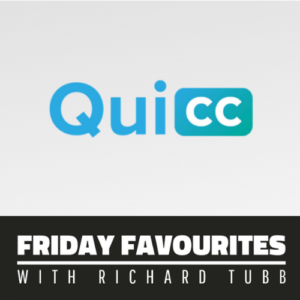 If you’re producing online video, then you’ll need automatic video captions.
If you’re producing online video, then you’ll need automatic video captions.
Did you know that almost 83% of views of videos online are made with the sound muted? That means if you’re producing video online, then you need to make sure that you include captions in your video.
Every Friday I share one of my favourite finds of the week — a website, tool or an app that has impressed me.
My Friday Favourite this week is QuiCC – Automatic Video Captions.
What is it?
QuiCC is a service that will create automatic video captions and burn those transcribed captions onto your video.
How much does it cost?
QuiCC is free to use for videos of up to 2 mins per month.
Packages then start from $12/month for 10 mins of video.
Automatic Video Captions, Burned In
Online video is a huge opportunity for businesses. YouTube is now the worlds second-largest search engine behind Google. I run my own YouTube channel with videos for Managed Service Providers (MSPs) and the Avast Live Video for MSP series we ran last year has proven to be incredibly popular.
If you’re not using video for your business, then you need to think about doing so.
The major web-browsers and social media sites all now play videos muted. This means that if your video doesn’t have captions, then you’re unlikely to grab the viewers attention.
QuiCC helps you add automatic video captions to your online videos.
To use QuiCC, simply sign-up for an account and then upload your video file to the QuiCC website.
QuiCC goes away and uses an Artificial Intelligence (AI) engine to create the captions for your video.
The QuiCC AI engine does a really good job with what it hears, regardless of accent or background noise.
But if you spot any errors in the captions, you can easily edit them.
Once you’re happy with the captions, you finalise the video and the captions are burned into your video file.
I met Krissy Buck of QuiCC while at Cambridge Social Media Day recently and we put QuiCC to the test!
I’d say the above 1-minute video clip took me around 3-mins to check and correct any errors on, before quickly downloading and publishing online. Impressive!
QuiCC also allows you to use custom font styles and colours for your captions and has 11 different language profiles (including UK English and US English).
The team at QuiCC have also recently launched an iOS beta app. The app allows you to upload and edit videos directly from iOS devices, as well as the web.
How can I get it?
Visit the QuiCC homepage and sign-up for a free account.
You can also visit the QuiCC Facebook page or follow @QuiCC_app on Twitter.
Thanks to Krissy Buck of QuiCC for demonstrating the QuiCC platform to me!
You Might Also Be Interested In
Placeit – Free Product Mockups
Why you should listen to Podcasts for personal development
Captivate – Growth-Orientated Podcast Hosting
The post QuiCC – Automatic Video Captions, Burned In appeared first on Richard Tubb.



December 30, 2019
Mental Health for MSP Owners – TubbTalk #65
In a candid interview, Richard speaks with New York Times best selling author Chris Brogan about how MSP owners can deal with mental health challenges
Richard speaks to Chris Brogan about a topic that is very important for MSP owners – mental health. Chris is a New York
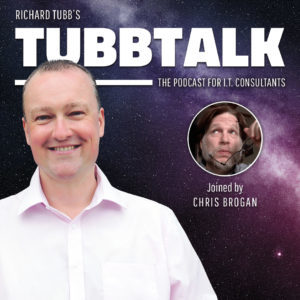 Times bestselling author of nine books and counting and a highly sought after keynote speaker. He has consulted and advised on business and digital marketing with pretty much all the top brands you know, including Disney, Sony, Microsoft, Google, and many, many more.
Times bestselling author of nine books and counting and a highly sought after keynote speaker. He has consulted and advised on business and digital marketing with pretty much all the top brands you know, including Disney, Sony, Microsoft, Google, and many, many more.
An Interview with Chris Brogan
Chris is one of the biggest influences on me and my business journey. But today, Chris and I are going to talk about a topic that I feel is one of the most important things in business. We’re going to talk about mental health for business owners. I was diagnosed with clinical depression when I was in my early 20s, but I’ve never publicly spoken about it before, and Chris, you’ve spoken openly and honestly about your own mental health challenges. And quite frankly, this is encouraged and inspired not only me, but so many others that I know to talk about it as well.
Why have you shared your mental health challenges with others?
I’ll be the first to admit that I don’t always have the best borders and boundaries around what I should and shouldn’t share. There’s some humour to that but it is also true and I think that is what goes wrong a lot in helping people, advising people and giving people guidance.
One challenge with my job, is that it doesn’t always do what it says on the tin. Because, we forget that some things work until you have to deal with depression. You might want to do video, but you went through abusive situations, or you were adopted or in foster care system. There are all these things that could make us think we are wrong or are broken and I just started coming to the realisation that maybe if we all realise that we are a little bit dented, that we all have scuffs in our life, we can still find a way to be the best version of ourselves. Maybe other people would get on to that and realize it’s like improv acting. It’s Yes and. So yes, I deal with depression and I’m successful business advisor. Yes, I deal with clinical depression, and I’m ridiculously creative and my sensitivity and some of the things that are negative to being depressed are most definitely something that I move forward.
The more I started doing podcasts and being on people’s videos the more people would come up quietly and say: ‘Oh my gosh, I’ve been dealing with this for such a long time” or: ‘Someone I love has been dealing with this and I don’t know how to be helpful”. And I feel like there is a whole body of work around this. It’s not the kind of thing that you get invited to keynote about, but if so many people are dealing with it then I think it’s important that we make the message known. And all we can do it provide the information so that on people’s own time and when they are ready to think, read or hear about it they can learn about some ways of bringing themselves forward while still dealing with that depression.
Why are business owners not talking about mental health?
I’ve had this conversation privately with a number of other people who struggle with all manner of mental health issues. What is the difference between a physical ailment and a mental health ailment? The best way to demonstrate this is with an example. Three years ago I was knocked over by a car in a hit and run accident. I did not hide that accident. A few months later I almost bled to death in a hospital on my 40th birthday. And guess what? When I didn’t die, my friends and family let people know I was okay. And people understood and people supported me. And yet, when I’ve had really serious mental health issues, I’ve kept it to myself. Why is this?
There’s so much weight that goes with this. And there is also the gender stereotype that males have to be the strong one. Men get depression as much as women, but they don’t treat it. Even when it’s a medical problem like a heart problem they don’t go to the hospital as much. So that is a challenge. The other challenge that exists in certain cultures, for example the United Kingdom, is that there is a tradition to just ‘carry on’. The Western culture is basically to not show any weakness. And Eastern cultures aren’t much different. People want to kick it to the side and view it as a defect.
The other thing people misunderstand about clinical depression is that it is chronic. There is feeling depressed, which is in response to something that didn’t go your way. I feel bad about that. Or I found out my wife was cheating. That’s not depression, that’s an event that occurred and you feel bad about that event as an acute response.
Clinical depression is a lot like Diabetes. It’s a bunch of chemicals rolling through your body. It’s like a stigmatism where you need glasses to fix it. You can’t see without the glasses. Clinical depression that you and I are discussing is a chemical scenario. People say the dumbest things to people dealing with depression, like think of all the good things in your life. It’s the same as saying think about broccoli to someone with Diabetes, yeah but you are still going to die if you don’t take the insulin.
How do you help people understand the difference between having a bad day and depression?
We all have blue days and I the reality is most of us will go through some bouts of depression in our lives or at least one bout of depression. But how do you understand the difference between having a bad day and potentially seeing the signs of someone slipping into depression? I am no legal or medical professional. But my experience is that when you go through a series of days in a row, when there is no particular reason to feel a particular thing. You just feel it. My eldest who is 17 said the other day: “I think I’m getting ready to go into a depression. Everything seems fine. I don’t have anything I need to deal with, but I’m pretty sure I’m feeling it”.
So you start to feel it, you start to know it when you help others deal with it or when you yourself are trying to understand it. So what happens is, when we’re dealing with our depression, the chemical stuff pushes us to use our mental storytelling powers to put us in a really rough way. We feed that depression a little bit with our mind when the chemical stuff happens. And so you might be thinking as the morning starts, I’m okay, sun shining. I’m all right. I’m fed. There’s no water coming in on my head from the roof. I don’t see why I’m feeling depressed. You do have to decide is that just me bringing this up? Is that something I can work out with the therapist? Or is this that these chemicals are kind of bringing this about it me one way to do it.
And don’t forget there is also seasonal depression, which is still a chemical depression, but is very much impacted by lack of Vitamin D, lack of sunshine. There’s a lot of challenges that go with seasonal depression and I get that no matter what, even if I’m on medication. So, what we have to do it separate those things out and ask some questions. Has this been a series of days? Is this starting to feel like it’s always?
The most important thing to know about depression is that depression lies to you, in your own voice. Depression uses the words always and never, all the time. So you always mess things up. You never quite get happy, you never lose weight that you say you’re going to lose. All these kinds of language is almost 100% guarantee depression language. Because we don’t think that absolute any other time. So I think those are ways to identify if that helps.
Is it worth looking into a vitamin D boost if you suffer from depression?
Seasonal affective disorder can affect lots of people, especially in the UK or Boston where we don’t get sunlight for weeks or months at a time. Lack of vitamin D can really affect mood. And it might be worth looking into something that boosts vitamin D like a light or visor.
Yesterday around 3:30 in the afternoon, I was lounging near my bed and thinking that looks really comfy over there. I could have gone to bed right then, but I wasn’t really sleepy. That’s seasonal and I could go into bed, I could probably take a nap and it would probably feel really good. But I honoured the fact that I’m not dealing with depression right now. And I’m not going to give this one to depression. I think I’ll just stay awake and do some work. I live like a vampire in my house, it’s so well lit right now because these five windows are facing the sun and I have two big bright LED lights but at nighttime it is dark, it’s just one laptop screen in a room full of nothing.
So we have tools that allow us to sort of set our environment a little bit. And with real solid chemical depression, you oftentimes need medicine to help with it. But if you’re on the edges of something, you can also change your environment just a wee bit, and make it a lot better.
How do you deal with ‘red flags’ for depression?
There are red flags that crop up that hint that you are on the verge of depression. There are commonalities, for instance, exhaustion and losing interest in things. How can you deal with them when they start to crop up?
The most common one I realise is the always and never kind of language. That’s probably the number one red flag.
And I want to talk for a quick moment about medication because there are many, many, many different types of medication for depression and anxiety. We almost always bundle depression and anxiety, you don’t always have anxiety with depression. I do as it turns out, because I’m lucky. And anxiety just sort of exacerbates the depression stuff. The most common set of drugs for depression are all called SSRIs, serotonin something reuptake inhibitors. And what it means basically is your body has stopped allowing you to feel certain feelings because of this chemical and if you take this other medicine, it’s supposed to reopen the pathway. The challenge with SSRIs Is that a good majority of them do something else to some other part of your moods and feelings.
Firstly, you get fat on them. They make you gain weight. Secondly, you lose your sex drive on most of them, and I said to my Doctor the first time that happened that I’d rather die because that’s who I am. There are a few that sometimes work better. And then there are some experimental ones. And the last three years I have been involved with an experimental drug here in the US. When I say experimental, it’s been a drug for a very long time, but now it’s being used to try and treat depression.
It’s called Ketamine. Some people will have heard of it from the party scene, they call it Special K. It started off as an anaesthetic, to knock people out. But somewhere along the way someone thought that this could work for Dopamine and I think this would help with depression. And a few years ago my Doctor said I should try it. He said it works insanely well for about 11% of people. It works fairly well for about 60% or so of people. It has no effect for 20% of people. And for about 10% of people it’s a very, very bad idea. So I tried it. I usually never win with medication, if there is a side effect I will get it. But it was flawless for me. I took this drug and I had to take an Uber ride to and from the doctor’s office because again, you hallucinate like crazy. I’ve never done an illicit drug in my life. I fell asleep, I called Jacqueline and I said I’m going to sleep the whole day and i slept dead until the next day. When I woke up I felt like Mary Poppins and Dick Van Dyke, like I was going to clean some chimneys. I was excitable. I went an entire year on one dose of this drug. An entire year, I pushed all chemical depression out of me. There were times when I felt like I might be heading towards depression. And I literally felt this physical flush in my body, almost like when you’re embarrassed, like you’ve got caught with your pants off or something. That flush in my body and then I was good again. And I thought: “Oh my gosh, this is magic”.
Ketamine is a naturally occurring molecule, but it’s not exactly without a flaw. They’re now looking at Psilocybin, which is magic mushrooms, as a treatment for clinical depression. I haven’t tried that and it’s not available around me, Ketamine is, but I point that out just to say, one huge challenge with people dealing with depression is that it takes a long time to figure out which medicine is going to work for you. And it’s super important not to give up on it.
How do you handle depression in a healthy way?
Two things that are really important for business professionals. The biggest thing about admitting you deal with depression, is that people immediately question your reliability and trustworthiness. Not that they think you will start telling lies, but that you’re just not going to be able to deliver. And if you are not functional you can’t deliver, so it can be hard to keep employment. So there are some real risks to just outing yourself as a depression suffer, even though there shouldn’t be. So you have to tread carefully in the way that you approach it.
And the way I have approached it is that I’m open about it to everybody because I’m my own boss. But that means all my money comes from people who are clients who give me money. And so as my own boss, I don’t have to ask the boss for a sick day. But I do have to share with my clients that I suffer from clinical depression, which is something I manage with medicine and lifestyle. But sometimes it can slow down my delivery times and I have to manage expectations around that. Most people will be okay with this. Partly because they don’t want to talk to you about your depression, but partly because you’ve really approached it in a very professional manner. You’ve been straightforward about why you are going to potentially miss deadlines and people appreciate that frankness.
So, I deal with depression by being open, and by giving myself the bandwidth to deal with depression. It’s sort of like when you are driving in the snow. You have to give yourself a little more space because you need more time to break.
That’s like depression. But on top of that you are driving around with the parking break on so it’s slower and harder. So you need more time and you need less things to do.
I’d recommend that as a business owner you clear your schedule just a bit, because you are going to need some room, just to get through what you have to do. Most business owners and entrepreneurs are typically quite chaotic. So when it comes to mental health, being an entrepreneur is quite a difficult path.
How can business owners be kind to themselves?
There is a great book called ‘Self Esteem’ by Dr. Matthew McKay. Every copy I’ve ever seen out in the wild looks super old, there’s like 1970s fonts and rainbows on it and things like that. It’s awful. It’s a fairly dry book. But there is a concept in there, called the inner critic and I think he’s the one that created it. There is a voice in our head that says a lot of negative stuff to us all the time. Even non-depressed people have it as well. It’s called the inner critic and the inner critic exists for an interesting function in theory. This voice exists. It tells us that something bad is going to happen, because it’s trying to save our mental psyche from that something bad.
For example, you are going to start a new diet. But you’ve always failed all diets. So you are going to fail this one too. The inner critic is such a negative person. And it is negative because it thinks it’s helping you. But the problem is, just as depression lies, the inner critic is only working on past experience. And we always fail until we don’t fail. But the inner critic has no idea what to do with it. This next part is not Dr. Matthew McKay, it was my take on the inner critic. I came up with a fake thing called the inner coach. And the inner coach says nice things. A good coach is trying to encourage the good stuff and quietly dissuade the negative stuff.
You can accept the inner critic as a real voice, but it means you no harm. You can say thank you, I hear what you’re asking and what you are telling me and I appreciate your point of view. It’s kind of like a parent. But, then there’s a little quiet parenthesis that tells it to shut up. Then the inner coach kicks in and give you some new approaches, and some new things to try.
So the number one way to be kind to yourself is to fire your inner critic and politely hire an inner coach.
Number two is what I said before, clear your schedule a bit. You know, when depression starts to hit, when you feel it’s going to hit, when you are a business owner and you’re dealing with all the chaos, clear your schedule a bit. I schedule my days to 40% total. That’s it. 40%. Because how does the computer run at 100%? It runs great for four and a half minutes and then it explodes. How does your phone work at 100%? It locks up and you have to reboot. Or it dies. Anything at 100% explodes. So stop scheduling yourself to 100% or 120%. Schedule at 40% and make sure the processes are picking up the slack.
What can people currently going through a depressive episode do to help themselves?
But what if you’ve fired the inner critic and cut back to 40% capacity, but are still going through a depressive episode? What practical things can business owners do to handle the 40% workload when you are in the middle of the depressive episode.
I always tell people that if they can’t get out of bed, to make that the first task you tackle. If you don’t want to shower and you don’t have to then don’t. Your life will go on if you are smelly.
Depression is a single player sport. We look so much at ourselves. And one way to get out of it is to remember to go and look at, and ask for help from other people. If you aren’t depressed and you take nothing else from this conversation, it is to help other people. Don’t avoid their problem. Make it a team sport, it will make it better. Because depression is a very isolation based tool. And the only thing most all of the studies agree on is that the worse your social support system is, whether that be friends, colleagues or family the shorter your life will be. There is no solid answer, but being a hermit can knock 10 to 20 years off your life. So maybe spend some time putting together some relationships and I say that being an insane introvert and also not liking to go places. But the more we do it and the more we get out in the more we say hi over, you know, a glass of iced tea somewhere at a bar. The more we have a chance.
What habits have you learned that keep the black dog depression in its cage?
Earlier we mentioned red flag and how to see them coming. A resilience plan can help you keep the orange and red flags at bay. Habits and routines to help keep the black dog at bay.
Firstly, I’d suggest letting the black dog out of its cage. Have you ever been on a diet and think, if I eat that Reese’s cup I’ve failed. And you spend so many mental calories on that Reese’s cup. It’s like a dog at the table looking at the piece of steak. What is the dog thinking apart from the steak? Nothing. So eat the damn Reese’s cup. With depression, let the dog it. I’m dealing with it. I’m going to deal with it. If I need to have a good long cry I do. I don’t try to resist it.
The other thing is to use index cards to outline some really simple processes. It could be as simple as going for a shower. It seems silly, but sometimes that is a win with depression. So put those on a card. And then maybe a card saying: who should I be emailing right now? If you ask yourself some questions in those moments it really helps and assuages some of the guilt.
Two and a half years of clinical depression in a row up until like last November now I learned that movement is a massive cure. You don’t want to hear that when you’re feeling down and you want to stay in your cocoon or bed. But movement helps. It’s almost like depression is, slowing me down. But if I walk I can get away from it a little.
So, use the card and let the dog out, because resistance wastes so many more calories and move your body.
Have you found any tech that helps your mental health?
We are both massive lovers of tech. And apps can help get through periods of anxiety and depression. There is this very old app that exists on most phones, but we tend to forget it’s there. And I admit that it’s so dusty and honestly, sometimes it gets hidden in the weird drawers of your phone and you can’t you can’t find it. And it’s called Phone. And I found that if I actually push on that green thing you can talk to someone on the other side. And it’s ridiculous and more helpful that I thought it would be. That is my favourite app that I don’t want to use when I’m dealing with depression.
Do you think social media affects mental health?
Social media can provide a digital distraction. We could record an entire podcast on it. But social media and all the notifications can affect mental health too. There is so much treacle. One thing to remember is that social media is everyone else’s highlight reel. (I wrote more about this here: Social Networking is a life’s highlight reel, not the whole story) And you are comparing their highlight reel to your full tape. And, you know, the thing about cliches is that they’re always true, at least a little. That’s why they’re a cliche.
So with distractions, for instance productivity, a lot of productivity is just noble masturbation.
It feels good, and you can justify it till the cows come home, but it’s not sex. It’s not the actual act. It’s noble masturbation. So it’s an addiction, right? Alcohol addiction, drug addiction, sex addiction, gambling, addiction. All of these addictions essentially handle a very specific use case, which is this thing here is bothering me and hurting me. And we use social media in the same way.
Social media is so tied to the same mental triggers as gambling addictions, as well as cocaine. We get the same dopamine hit from cocaine as we do when we see a notification pop up. The only great difference is that with cocaine, the pleasure last a lot longer than when you look at something on social media and see another conference that you didn’t get paid to speak at, another great deal that someone else closed instead of you, or an ex that is looking hotter than ever with a David Beckham lookalike. There are so many ways this tool of social media can hurt your feelings. You can use it, or you can abuse it.
We over-prescribe leisure time. I’ve deleted most of the apps off my phone. We aren’t supposed to live the life of a monk. But we give ourselves far more leeway than we need and I think we need to reign that in just a wee bit. Mobile interfaces make it way too easy for us to waste time. But without these apps on our phone we will still be informed. Think of the UK election which has just happened. Is there anyone that doesn’t know the result? No! Everyone alive knows how the vote went. You don’t need technology to be informed.
With all these tools you need to decide how you want to consume and curate content. Not everything that is bad is good. Nor everything that is good is bad. I take a drug for my depression that people use at parties to lose their mind. A knife can carve up something or someone. Fire burns and kills but also feeds us. And so you can you can think and act and choose your weapons appropriately.
Is depression every used as an excuse?
There is a comedian named Tom Segura. He talks about disabled people. And he says, just because you have a disability doesn’t mean you can’t also be an asshole. You have to earn your cool points with or without your disability. And I think the same is true for depression.
And I had to teach my oldest this, because we both suffer from depression. Just because I’m depressed person does not mean I can be a dick to him. I can’t just punch him in the head. That’s nothing to do with depression, just bad parenting. Yes, I’ve seen people use depression as an excuse. They aren’t depressed they are just an ass.
And a lot of people self-diagnose. A lot of people will hear what we are talking about and think that this resonates. But until you go see someone who is informed and has more schooling that you then you won’t know. And I always tell my kids that no medical ailments allows you to be a total ass.
We all have to really strive to connect with people, we are all coming at it from a very different way. But at the end of it, there’s sort of a picnic and we have to all come to the picnic and there has to be civility and there has to be kindness. And there has to sometimes be an extension of understanding that not everyone there has the same capabilities. But, that doesn’t give anyone the right, except maybe Tourette’s to just bark out things that they have a challenge with.
What advice would you give to someone who works with a colleague with depression?
Number one, destigmatize it every time you can. Ask in a straight-foward and simple way how they are dealing with their depression. I have a friend who is currently transitioning from male to female and that comes with a free ride of the depression train. But I need to be able to openly ask how she is dealing with that.
Number two, is to understand that people are more than their depression. And we don’t don’t always want to talk about that part. I never do. But including them in something beyond the depression can be really helpful.
Grab some lunch, or a cup of coffee. Just some small atom of social connection, that’s important. You can acknowledge that they are not feeling great, because that is important. But they aren’t meeting the queen later, so that’s okay.
What do you hope will change in the next year about the attitude towards mental health?
I really, really, really, really hope that people can just openly talk about how the deal with depression and mental health.
We talked about transitioning and I bet some people were a little uncomfortable with that, maybe even took an earbud out for a second. But when it comes down to it that’s someone else deciding their gender and that for the most part impacts you in no way unless you’re their spouse. If you work with John and John decides that they’re Juanita, that changes nothing about the job. If Juanita is now your network systems admin and it used to be John. Well, they better do their damn job. It doesn’t matter what their gender is.
Well depression is the same. I deal with depression. I am not a depressive person. I have clinical depression. I usually try to make it so easy. I just deal with depression. It’s no different than telling someone you have diabetes. They both have to live within certain lifestyles.
And if we help more people in a year’s time, to understand that it’s just not a big deal. It’s just depression. And, I don’t mean that like, Buck up and be better and get over it. I mean, it’s that thing you do and then there’s life. So to me, that’s what I hope changes in a year is that more people are, Yeah, I totally deal with depression. What are you talking about? It’s just not a thing to worry about.
What advice would you give to a business owner struggling with depression?
Go to therapy. Even if you feel like you can’t speak to the people that you know and love. Secret strangers are much better to speak to talk to about your problems than your family and your loved ones because they don’t have a vested interest in the outcome of how you deal with it.
But when you talk to a good therapist they can help just ask some questions and just sort you just a little bit. And I think that it’s so important that you talk to someone, you cannot get through this yourself. If people say they got through it without therapy, they probably didn’t have clinical depression. It’s like really, really needing glasses and crashing your car 81 times because you refuse to get them. You’re not winning any prizes for that. So go see someone.
Make depression your business super power
Lastly, the opposite of every bad thing in our life is almost always some kind of a benefit, right? So the best superheroes have a weakness. And that weakness almost always is also kind of a power. And I think that we’re fascinated by superhero stories where the guy loses the power for a while because then you realize there’s the hero inside even though they don’t have the power anymore. This is true with depression. My secret power from depression is empathy. My secret power is I am an incredibly skilled person. At translating in digital and other forms, how to make someone feel something. And emotion moves product. That’s how I sell. You can decide on the specs all day long. But if you feel something about a product, that’s how you buy. I need you to know that because that’s the opposite of depression.
Mentioned in this Episode
Book: Self Esteem’ by Dr. Matthew McKay
Connect with Chris
Website: ChrisBrogan.com
Email: Chris@ChrisBrogan.com
Connect with Me
Subscribe to TubbTalk RSS feed
Subscribe, rate and review TubbTalk in iTunes
Subscribe, rate and review TubbTalk on Stitcher Radio
Subscribe and rate TubbTalk on Spotify
Follow TubbTalk on iHeartRadio
Follow @tubblog on Twitter
You Might Also Be Interested In
Moodbeam – Monitor Your Emotional Wellbeing
Productivity, Healthy Habits and Getting Things Done – TubbTalk #50
How Journaling and Trying New Things can Improve Your Business and Your Life – TubbTalk #37
The post Mental Health for MSP Owners – TubbTalk #65 appeared first on Richard Tubb.



December 26, 2019
Rocketbook – Reusable Digital Notebook
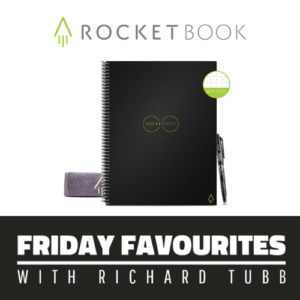 Do you go through paper notebooks like they’re going out of fashion? I used to until I found a reusable digital notebook!
Do you go through paper notebooks like they’re going out of fashion? I used to until I found a reusable digital notebook!
Every Friday I share one of my favourite finds of the week — a website, tool or an app that has impressed me.
My Friday Favourite this week is Rocketbook – Reusable Digital Notebook.
What is it?
Rocketbook is a physical notebook that you can write in with a pen, scan digitally via an app, and then wipe down and re-use again.
How much does it cost?
The Rocketbook range starts at £15.95
An endlessly reusable Digital Notebook?
How on earth can I get so excited about a notebook and a pen?
The Rocketbook range of notebooks has been a revelation to me!
While I am a confirmed technology geek, I prefer writing down notes with pen and paper when I’m in meetings and at conferences. I then digitally scan my notes into Evernote via my smartphone for future reference.
To the untrained eye, a Rocketbook notebook looks like any other notebook.
However, the difference between a Rocketbook notebook and normal paper notebooks is that you can wipe the pages of the Rocketbook down to use again and again.
You simply write in the Rocketbook as normal (using the supplied Pilot Frixion pen). When you’ve finished a page, leave the ink to dry to prevent smudging.
Then, when you want to re-use the page, simply dampen the microfibre wipe provided, wipe the page, and voila, you can write on it again!
The real magic of the Rocketbook is the app that accompanies the notebook.
You can scan one, or concurrent pages of your notebook using the app and save them as JPG or PDF. The Rocketbook pages have a black border around them that makes automatically identifying the pages a breeze for your Smartphone.
When you’ve finished scanning your page(s) then you can press a button and the Rocketbook app will send the digital scan to one or more of your digital destinations of choice. For instance, I scan and send meeting notes to Evernote and Google Drive from the Rocketbook app.
You can also use special codes when writing on the Rocketbook notebook pages. These codes will be recognised by the Rocketbook app and trigger functions.
For instance, if you put a double hash around writing, it’ll be recognised as a title. For example, writing ##Rocket Notebook Review## means that Evernote will name your scanned note as “Rocket Notebook Review” when filing it.
The Rocketbook notebook will literally be the last notebook you’ll ever buy!
How can I get it?
You can buy the Rocketbook Everlast Smart Reusable Small Note Pad – Mini A6 – Red – Reuse Endlessly at Amazon.
Other sizes such as the Rocketbook Everlast Smart Reusable Notebook - Letter A4 - Black, Dotted, Pilot Frixion Pen and Wipe Included are also available.
For more details, visit the Rocketbook homepage.
You can also visit the Rocketbook Facebook page, follow @GetRocketbook on Twitter or follow Rocketbook on LinkedIn.
Thanks to Claire Jenks of Claire Jenks Design for introducing me to the Rocketbook!
You Might Also Be Interested In
Sanebox – Email Management Software
Hullomail – Smart Voicemail in the Cloud
The importance of writing down your Goals
The post Rocketbook – Reusable Digital Notebook appeared first on Richard Tubb.







